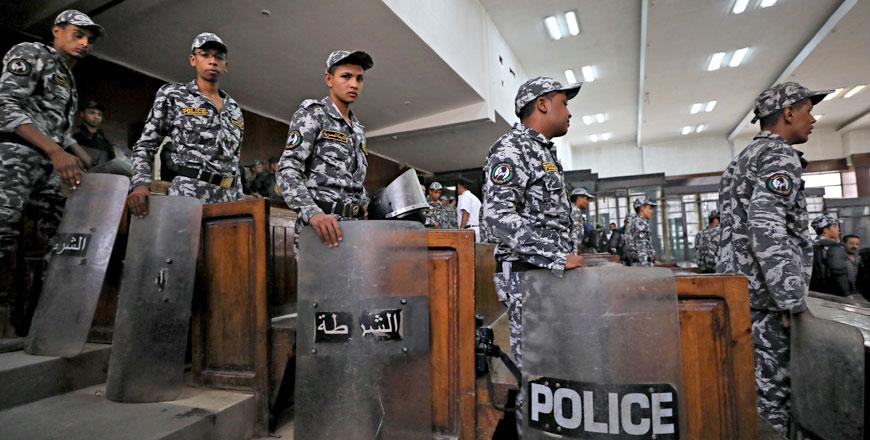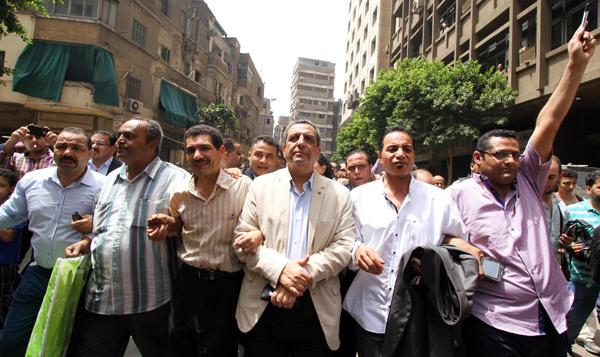You are here
Egypt looks to monitor popular social media users
By AFP - Jun 30,2018 - Last updated at Jun 30,2018

Police stand guard during a court session in which 739 people are being tried for participating in a 2013 sit-in in support of the Muslim Brotherhood in Cairo, Egypt, on Saturday (Reuters photo)
CAIRO, Egypt — Freedom of expression may shrink further in Egypt where lawmakers have approved the first reading of a bill that would monitor popular social media users in the name of combating “false news”.
Platforms such as Twitter and Facebook have become one of the last forums for public debate in Egypt since a November 2013 ban on all but police-approved gatherings.
In Egypt, more than 500 websites have so far been blocked, according to the Association of Freedom of Thought and Expression (AFTE).
On June 10, parliament gave preliminary approval of the bill, pending a final reading and then ratification by President Abdel Fattah Al Sisi.
Under the bill, Internet users with at least 5,000 followers would be placed under the supervision of Egypt’s supreme council for media regulation.
The council, known for its criticism of foreign media and television programmes accused of violating public morals, would oversee “every personal website, blog or electronic account of any person with 5,000 followers or more”.
It would also have the right to suspend or block such accounts if they “publish or broadcast false news” or information inciting “breaking the law, violence or hatred”.
“Every citizen will think 1,000 times before they can write a post in which they criticise the action of the government or the regime,” said Mohamed Abdelsalam, director of research at AFTE.
He urged social media companies to “reject the practices of the Egyptian government and stand on the side of the rights [of citizens] and civil society organisations”.
Waves of arrests
In another move in early June, lawmakers passed a law on cybercrime that allows authorities to block any website or account that threatens Egypt’s national security or economy.
Those who administer such websites face jail time or fines.
Domestic and international human rights groups regularly criticise violations of freedom of expression by President Abdel Fattah Sisi’s government.
Sisi, then defence minister, led the military’s July 2013 ouster of Islamist president Mohamed Morsi after mass protests against his rule.
Following waves of arrests in the wake of Morsi’s ouster, authorities have also detained activists and bloggers on charges of “publishing false news”.
Wael Abbas, a blogger and journalist, and Shadi Ghazali Harb, a youth leader during the 2011 uprising that toppled longtime president Hosni Mubarak, are among those arrested.
Lawyer Gamal Eid who heads the Arabic Network for Human Rights Information told AFP: “The problem is that the prosecution does not elaborate on the nature of the false news in the accusations.”
Khaled Elbalshy, a former press syndicate board member, said the new bill was “a continuation of the context of repressing the press and confiscating and silencing speech”.
“It’s an attempt to silence everyone who tries to speak, extending this control even to social media users,” Elbalshy said.
Several prominent activists, contacted by AFP, declined to comment.
In its defence, parliament’s media committee head Osama Heikal said that “electronic accounts have widespread access, more than some newspapers”.
Egypt, which ranks 161st out of 180 countries on the World Press Freedom Index compiled by Reporters Without Borders, was “not the first country to go in that direction”.
Related Articles
CAIRO — Egypt’s President Abdel Fattah Al Sisi has signed off on a law tightening controls over the internet in the country, the official ga
CAIRO — The trial of three top members of Egypt's journalists' union accused of allegedly harbouring two fugitive colleagues opened Saturday
CAIRO — French President Emmanuel Macron pressed his Egyptian counterpart on human rights on Monday, warning that stability and freedoms go

















